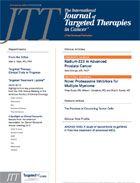BRCA1 Associated With Worse Survival in Breast Cancer
Women with breast cancer who were carriers of the BRCA1 mutation had increased mortality compared with noncarriers in preliminary results from a retrospective study.
Marjanka Schmidt, PhD
Women with breast cancer who were carriers of theBRCA1mutation had increased mortality compared with noncarriers in preliminary results from a retrospective study carried out in the Netherlands between 1970 and 2002, and reported at the AACR 2013 annual meeting. However, survival was not significantly different for BRCA2 carriers in this analysis.
Previous smaller studies in breast cancer patients showed overall worse survival forBRCA1/2carriers, but those studies focused on Ashkenazi Jews, who typically carry only three of the hundreds of possible mutation variants. Marjanka Schmidt, PhD, of Netherlands Cancer Institute in Amsterdam, and colleagues sought to determine whether these findings could be validated in the Dutch population, who would be likely to carry a broader spectrum of BRCA mutations.
“We have analyzed data from one of the largest, least biased,BRCA1-and2-genotyped breast cancer cohorts. These findings were not surprising to us. We expected worse survival in mutation carriers, who have an enormously increased risk of developing breast cancer, including contralateral breast cancer,” Schmidt said.
The study included 5518 women diagnosed with breast cancer before the age of 50 at one of 10 clinics in the Netherlands; 3.6% were found to beBRCA1mutation carriers and 1.2% wereBRCA2carriers. At a median follow-up of 11.3 years, overall survival (OS) rates were 1.2 times worse inBRCA1carriers than in noncarriers, and the difference was statistically significant (P=.07). The recurrence-free survival rate was 1.5 times worse inBRCA1carriers, and the difference was also statistically significant (P=.004). A trend toward poorer survival was observed in BRCA2 carriers, but this result was not statistically significant.
Interestingly, 86% of patients who were non-BRCAmutation carriers, 81% ofBRCA2carriers, and 29% ofBRCA1carriers had estrogen-receptor (ER) -positive tumors, which generally have a better prognosis than ER-negative tumors.
In a preliminary analysis, after adjusting for known tumor characteristics, the effect ofBRCA1status on survival remained strong but was somewhat attenuated. “So, part of the worse survival inBRCA1mutation carriers may be related to tumor characteristics as well as mutation status,” Schmidt said.
The next step will be to assess survival in various subgroups of patients in this large retrospective dataset, including characteristics such as ER status, progesterone receptor (PR) status, HER2 status, as well as luminal A and B types of basal-like breast cancer.
Schmidt said thatBRCAcarrier status and data from the subgroup analyses could be factored into decision making regarding the need for more-aggressive treatment.
